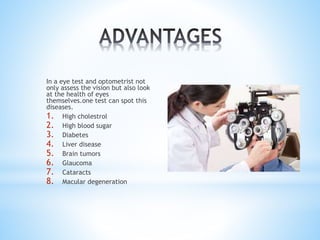Specialized Retina Service Near Me: Top-Notch Eye Care Professionals
Specialized Retina Service Near Me: Top-Notch Eye Care Professionals
Blog Article
Recognizing the Numerous Eye Conditions Treated by Specialized Eye Care Professionals
In the realm of eye care, specialized experts play an essential function in detecting and treating a vast array of eye conditions. As we begin on this expedition of the various eye conditions attended to by specialized eye treatment specialists, it becomes obvious that the detailed web of ocular health and wellness holds a myriad of remarkable understandings waiting to be revealed.
Common Refractive Errors
Refractive errors are common visual conditions created by a flaw in the eye's capability to appropriately concentrate light, resulting in blurred vision. Astigmatism is characterized by an irregularly shaped cornea, resulting in altered or obscured vision at all distances. Presbyopia is an age-related condition where the lens sheds its flexibility, making it challenging to focus on close things.
These refractive errors can be corrected through various approaches, including spectacles, get in touch with lenses, or refractive surgery. Eye treatment professionals play a critical function in detecting and handling refractive errors to aid individuals attain clearer vision and enhance their quality of life.
Age-Related Eye Conditions
One of the most common age-related eye problems is age-related macular deterioration (AMD), a condition that creates main vision loss and can make tasks like analysis and driving tough. Cataracts, an additional typical problem among older individuals, cause clouding of the eye's natural lens, leading to blurred vision. Regular eye exams with specialized eye treatment specialists are critical for very early discovery and administration of these age-related eye conditions to protect vision and keep eye health and wellness as people expand older.
Vision-Threatening Illness
Vision-threatening diseases encompass a series of severe ocular conditions that have the prospective to considerably impact a person's vision and overall aesthetic feature. These illness pose a threat of long-term vision loss otherwise quickly diagnosed and dealt with by specialized eye treatment professionals. Some usual vision-threatening illness include glaucoma, diabetic person retinopathy, age-related macular deterioration (AMD), and retinal detachment.
Glaucoma is a team of eye problems that harm the optic nerve, frequently due to high intraocular stress, leading to peripheral vision loss and possible loss of sight if left without treatment. AMD is a modern condition affecting the macula, leading to central vision loss.
Early discovery, regular eye examinations, and timely intervention are critical in managing vision-threatening illness to maintain eyesight and preserve top quality of Discover More Here life. Specialized eye care experts play an essential role in diagnosing, dealing with, and taking care of these conditions to stop irreparable vision loss.
Corneal Conditions
Corneal disorders incorporate a spectrum of problems that impact the clear front part of the eye, called the cornea. These conditions can lead to pain, visual disturbances, and in serious cases, vision loss. One usual corneal disorder is keratoconus, where the cornea thins and protrudes outward right into a cone form, triggering astigmatism and obscured vision. Corneal dystrophies, such as Fuchs' dystrophy, result in progressive vision loss due to irregular down payments in the cornea. Corneal abrasions, commonly triggered by injury or foreign things, can lead to pain, soreness, and sensitivity to light. Furthermore, infections like keratitis can irritate the cornea, potentially bring about scarring and vision impairment if not without delay treated. Treatment for corneal conditions differs depending on the particular problem yet might consist of medications, get in touch with lenses, or in serious instances, corneal transplants. Regular eye exams are necessary for very early discovery and monitoring of corneal disorders to maintain vision and eye link health.
Neurological Eye Conditions
Neurological eye conditions involve disorders that affect the link in between the eyes and the mind, influencing visual handling and total eye feature. These problems can materialize in different ways, impacting vision, eye movements, and also the sychronisation in between the eyes. One usual neurological eye condition is optic neuritis, defined by swelling of the optic nerve causing vision loss, shade desaturation, and pain with eye activity.
Another considerable condition is nystagmus, where the eyes make repetitive, uncontrolled activities, influencing aesthetic skill and depth perception. In addition, problems like amblyopia, commonly referred to as "lazy eye," arise from irregular visual development in very early youth, resulting in reduced vision in one eye.
Neurological eye problems need specialized treatment from experts like neuro-ophthalmologists who have experience in both neurology and ophthalmology. Diagnosis commonly includes a comprehensive eye exam, imaging research studies, and collaboration with specialists to attend to the underlying neurological issues impacting the aesthetic system. Treatment strategies can include medication, vision therapy, or in severe situations, medical interventions to take care of these complex problems efficiently.

Final Thought
In final thought, specialized eye care professionals deal with a vast array of eye conditions, consisting of typical refractive errors, age-related eye conditions, vision-threatening conditions, corneal conditions, and neurological eye conditions - refractive surgeries in al. By recognizing these numerous conditions and looking for proper treatment from eye care professionals, individuals can maintain ideal eye wellness and vision. It is important to prioritize see this site routine eye examinations and comply with suggested therapy plans to preserve and secure one's vision for the future
Report this page